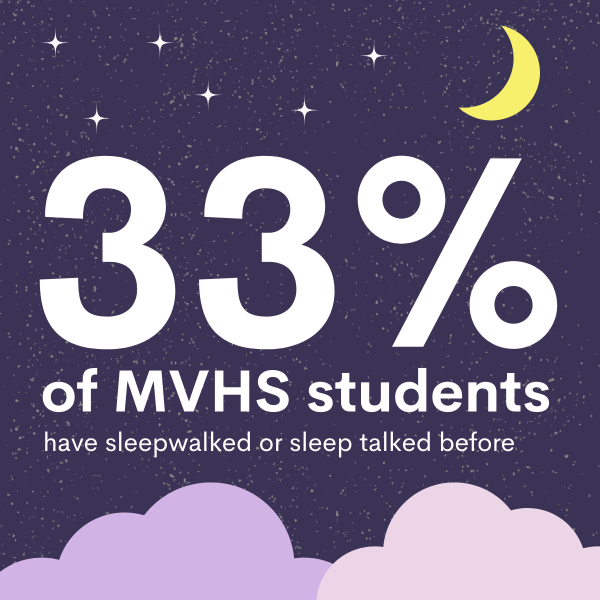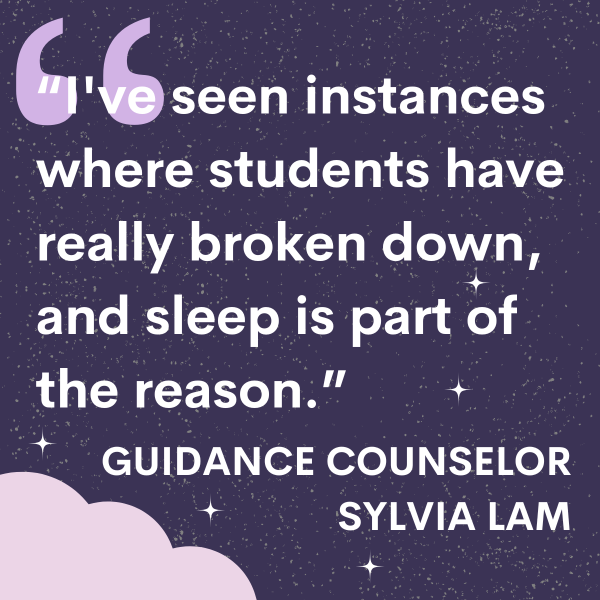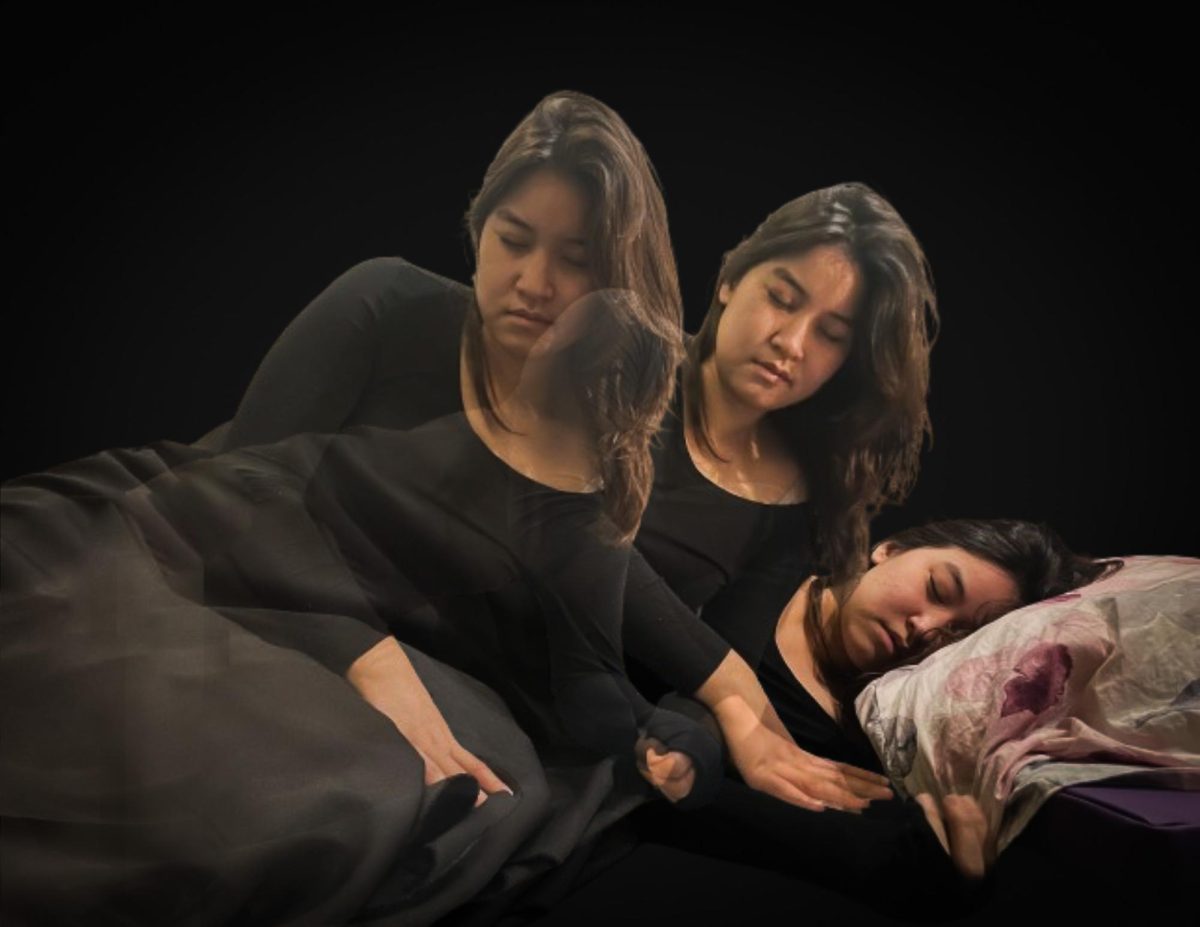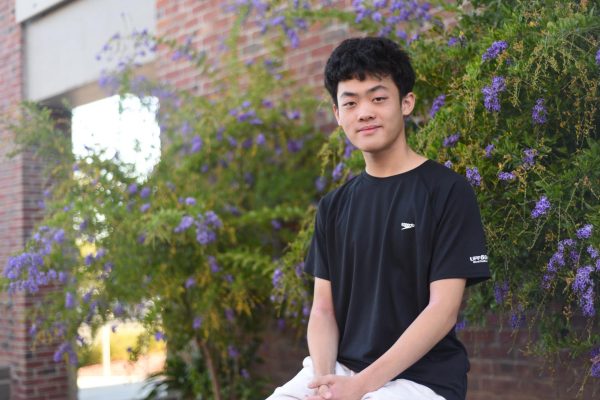In the quiet, pitch-black hallways of her home, senior Elise Chiu would embark on nocturnal journeys as a child. Asleep but moving in the middle of the night, she navigated through the dark with her eyes open, unaware of her actions. On one occasion, her mother’s calls echoed unanswered as Chiu wandered into her brother’s room. There, she sat silently at his desk, until she had to be gently guided back to her bed.
“The next morning was just a really funny story because neither my brother nor I knew what I was thinking in my head or what I was trying to do,” Chiu said. “It’s just these kinds of unintentional things that I find really amusing.”
In a survey of 143 students, 33% of MVHS students have experienced sleepwalking or sleep talking at some point in their life. While Chiu feels that sleepwalking is a silly and harmless experience, MVHS parent Linda Truong believes that there may be risks, after witnessing her 13-year-old son Nathan both sleepwalk and sleep talk.
“Initially, I thought it was funny because I’m like ‘Oh, he’s just speaking gibberish,’” Truong said. “Or sometimes we don’t even realize he’s sleepwalking, because he’ll come in and he’ll say something, or he’ll just walk into our room and walk out. Sometimes I’m worried because what if he just opens the door and walks outside? I’m worried he’ll open a knife drawer or something and grab some sharp objects. I also worry that if he sleepwalks and I’m not aware, that he might get himself in a dangerous situation.”

Stanford Medicine reports that sleepwalking is most common in children, and conditions like fatigue, anxiety and a lack of sleep are often contributing factors. Indeed, Chiu feels that the “Sunday scaries” — the anxiety before a school week begins — and other subconscious thoughts might have contributed to her sleepwalking. Similarly, Truong believes that similar factors of stress and sleeping late led to her son engaging in various sleep behaviors.
“From what I’ve read and seen, it sounds like it happens when he’s had a day where he was doing a lot of things and then staying up really late, or watching a movie that was a little bit scary,” Truong said. “Somehow those things would trigger him to sleepwalk or sleep talk. My son usually sleeps around 8:30 p.m., but there are days where he stays up until like 10 p.m. or 11 p.m. If he does that for a couple days, then I’ll notice that after a couple of days, he’ll start sleepwalking and sleep talking.”
Guidance counselor Sylvia Lam emphasizes the importance of getting enough sleep and maintaining a healthy sleep schedule. Lam believes that sleep has significant effects on students’ physical and mental health at MVHS.
“Our family values sleep so much,” Lam said. “Eight hours at minimum, and I would say we start that at a very young age, because that’s something that’s important to actually build in and make it a habit. Without it, I think your health is definitely affected. It could be mental health, it could be physical health. I’ve seen instances where students have really broken down, and sleep is part of the reason.”
In addition to a healthy sleep schedule, Chiu reiterates the significance of self care. She admits that it is something she is trying to work on since she faces eczematous episodes. Several nights have passed where Chiu has woken up with scars and scratches on her arm, with no recollection of how they got there. In contrast to her sleepwalking, her episodes have gotten more frequent and she believes that the main factor is caused by stress.

“It’s something that I have to always think about even though it isn’t always a conscious thought,” Chiu said. “I have to worry when I go shower every day or when I wake up and have to take care of my skin. It affects me more because when I go on vacation, I always live in the fear of thinking that I could have an infection. It’s not only something I have to worry about at nighttime, but it’s also something I have to worry about throughout the day.”
However, Chiu says that it no longer bothers her as she has gotten used to these thoughts, explaining that it only serves as a reminder for her to indulge more in skincare and self care. Truong agrees, even though she had initial moments of worry after her son’s first instances with sleepwalking. After doing her own research and going to the pediatrician, the worry faded into amusement and are now humorous stories that they can tell each other at the dinner table.
Truong recalls a particularly comical memory where her son barged into her daughter’s room in the middle of the night, demanding privacy. Her daughter proceeded to suggest that if he valued privacy, then he should go back to his own room. Her son then had a full blown conversation until he finally decided to return to his own room. It is interactions like these where Truong feels confused whether her son is sleepwalking or actually awake.
“It doesn’t feel real just because sometimes he’s having conversations with you,” Truong said. “Sometimes you can direct him, like if he’s going to turn on the water faucet and you tell him not to, for some reason he can stop himself. It’s as if he actually sees where he’s going. It’s not like he’s blindly walking. I’m like, ‘Oh, are you awake? Are you not?’ I think that’s what makes it feel unreal.”
To combat these conditions, Lam suggests giving your mind rest. Lam explains how your mind will constantly be overloaded if other stressors are running through it, disrupting sleep.
“I think really balancing out your overall schedule is important and not taking on more than you feel like you can manage on your plate,” Lam said. “I think being able to find that sweet spot in terms of all that you have on your plate so that you’re not over extended is how you can prioritize your sleep too.”
Music credit: Don’t Fret – Quincas Moreira












